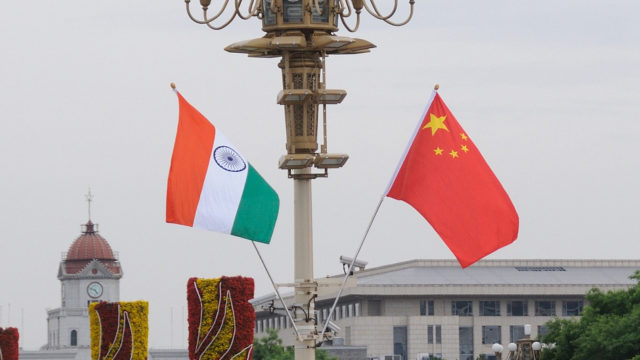Watch the Video: The China-India Border Dispute: Assessing the Outlook for 2022

On Tuesday, March 1, the Jamestown Foundation held a webinar on “The China-India Border Dispute: Assessing the Outlook for 2022” featuring Jagannath P. Panda, Manohar Parrikar Institute for Defence Studies and Analyses; Sudha Ramachandran, independent journalist; and Joel Wuthnow, National Defense University.
A day before the opening ceremony of the 2022 Beijing Winter Olympics, India announced a last-minute diplomatic boycott. Unlike the other countries that also declared diplomatic boycotts, India’s decision occurred not in response to the People’s Republic of China’s (PRC) human rights violations, but to the selection of a former People’s Liberation Army (PLA) regimental commander who fought in the June 2020 Galwan Valley border clashes as an Olympic torchbearer.
The deadly Galwan Valley skirmishes resulted in the deaths of 20 Indian soldiers and an unverified number of Chinese casualties, making it the most violent incident along the border since the 1960s. Since June 2020, Beijing and New Delhi have simultaneously engaged in competition to shore up their respective strategic positions along the Line of Actual Control (LAC), and intensive diplomatic negotiations aimed at making progress on the boundary dispute. For example, China has accelerated its construction of transportation, electricity, energy, and broadband infrastructure along the border with India in Tibet. Earlier this year, the PRC passed new legislation empowering the PLA and People’s Armed Police (PAP) to use force to safeguard land border security, and resolutely respond to any act that violates China’s territorial sovereignty.
Although both sides have stated their desire to resolve the military stand-off and improve relations through ongoing bilateral dialogues, little progress has been achieved. The 13th round of border talks held in October were particularly tense. In addition to the land border law, China further unsettled India with the recent announcement by the Ministry of Civil Affairs on the standardization of the names of 15 places in the Northeast Indian state of Arunachal Pradesh, which China also claims and calls “Southern Tibet.”
Featuring
Jagannath Panda
Research Fellow and Center Coordinator for East Asia, Manohar Parrikar Institute for Defense Studies and Analyses (MP-IDSA)
Sudha Ramachandran
Independent Researcher and Journalist
Joel Wuthnow
Research Fellow, Center for the Study of Chinese Military Affairs, Institute for National Strategic Studies, National Defense University (NDU)
Moderator
John S. Van Oudenaren
Editor-in-Chief, China Brief; China Program Manager, The Jamestown Foundation
Speaker Bios
Jagannath Panda is a Research Fellow and Center Coordinator for East Asia at the Manohar Parrikar Institute for Defense Studies and Analyses (MP-IDSA), New Delhi. He is the Series Editor for “Routledge Studies on Think Asia.” Dr. Panda is the Co-Editor/Author of the book- Chinese Politics and Foreign Policy under Xi Jinping: The Future Political Trajectory (Routledge, 2020).
Sudha Ramachandran is an independent researcher and journalist based in Bangalore, India. She has written extensively on South Asian peace and conflict, political and security issues for The Diplomat, Asia Times, and Geopolitics.
Joel Wuthnow is a Research Fellow in the Center for the Study of Chinese Military Affairs, Institute for National Strategic Studies, at the National Defense University (NDU). Prior to joining NDU, he was a China analyst at the Center for Naval Analyses, a post-doctoral fellow in the China and the World Program at Princeton University, and a pre-doctoral fellow at the Brookings Institution.



